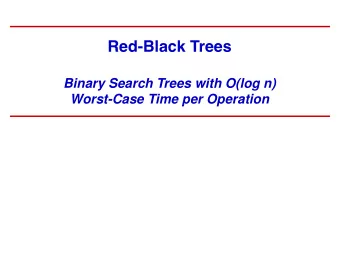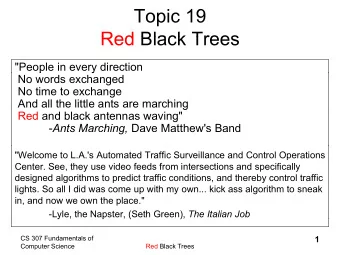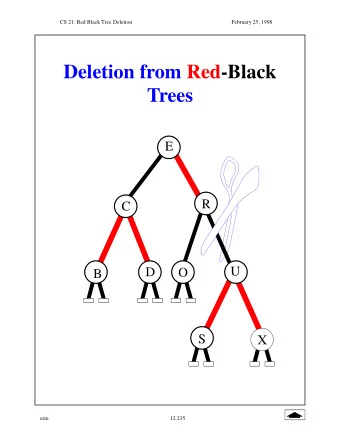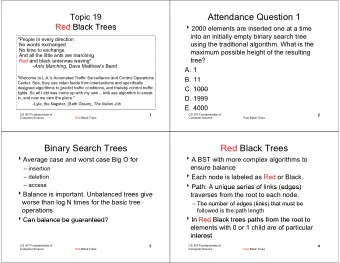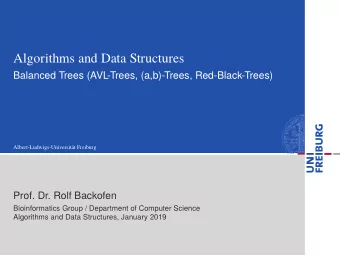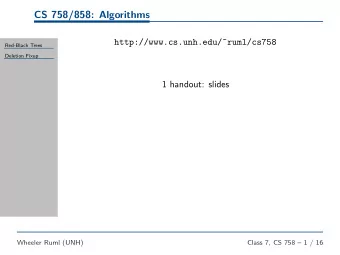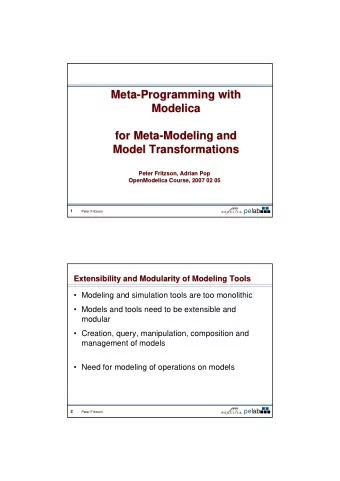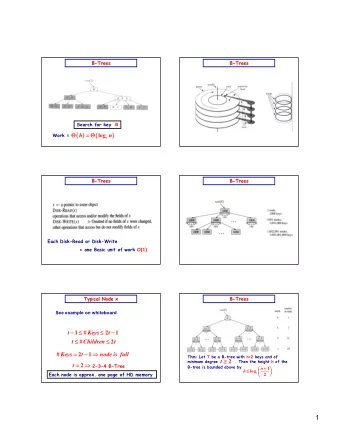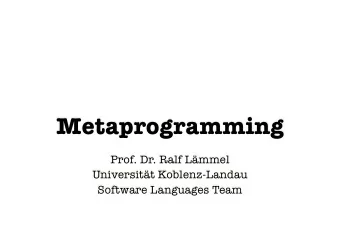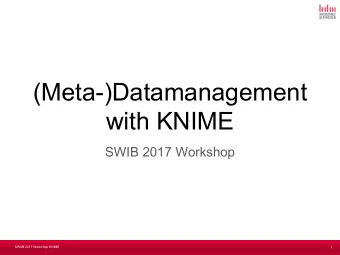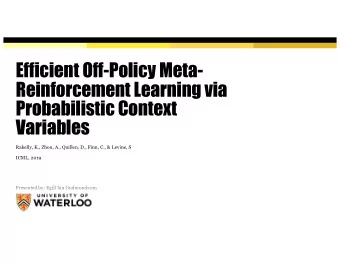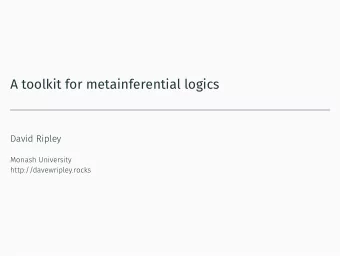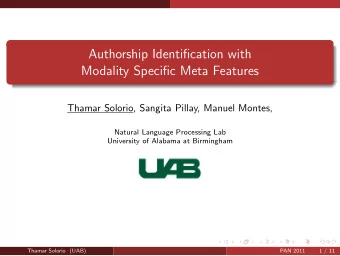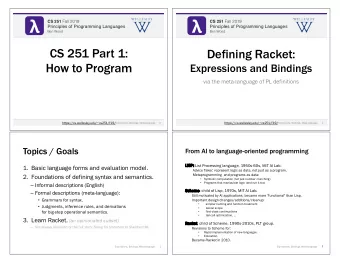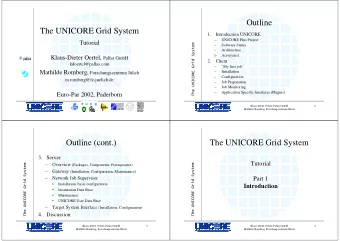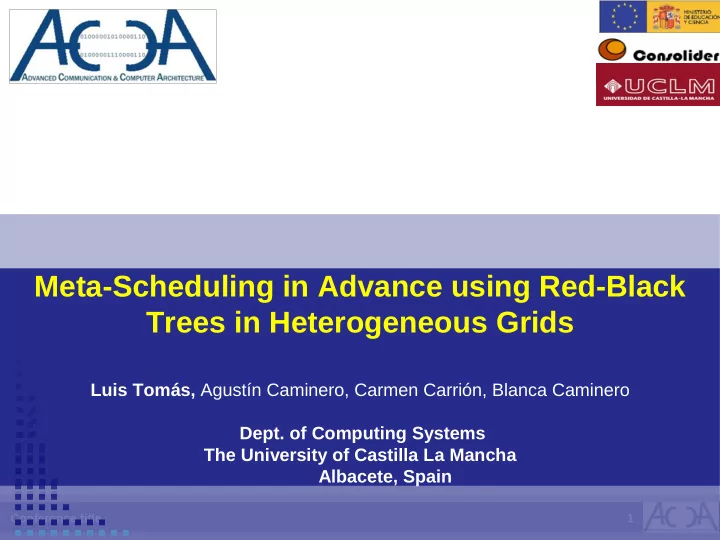
Meta-Scheduling in Advance using Red-Black Trees in Heterogeneous - PowerPoint PPT Presentation
Meta-Scheduling in Advance using Red-Black Trees in Heterogeneous Grids Luis Toms, Agustn Caminero, Carmen Carrin, Blanca Caminero Dept. of Computing Systems The University of Castilla La Mancha Albacete, Spain Conference title 1
Meta-Scheduling in Advance using Red-Black Trees in Heterogeneous Grids Luis Tomás, Agustín Caminero, Carmen Carrión, Blanca Caminero Dept. of Computing Systems The University of Castilla La Mancha Albacete, Spain Conference title 1
OUTLINE Introduction Meta-scheduling In Advance Implementation Experiments and Results Conclusions HPGC 2010 2
OUTLINE Introduction Meta-scheduling In Advance Implementation Experiments and Results Conclusions HPGC 2010 3
INTRODUCTION Introduction The Grid infrastructure must provide the needed services for automatic Meta- resource brokerage. Scheduling In Advance This infrastructure is named “meta-scheduler”. Implementation Experiments Brokering problem: and Results – Heterogeneous and distributed nature of the Grid. Conclusions – Differing characteristics of different applications. How to solve this problem: – To ensure that a specific resource is available when the job requires it. – To reserve or schedule the use of resources in-advance. HPGC 2010 4
INTRODUCTION Introduction Advanced reservation: Meta- Scheduling In – Restrictive or limited delegation of particular resource capacity. Advance Implementation – Provide some QoS by ensuring that a certain job ends on time. Experiments – Increase the predictability of a Grid system. and Results Conclusions Disadvantages: – Incorporating such mechanisms into current Grid environments is a challenging task due to the resulting resource fragmentation. – Reservations may not be always feasible : • Not all the LRMS permit them. • There are other types of resources which lack a global management entity (bandwidth). HPGC 2010 5
INTRODUCTION Introduction This is the reason to perform meta-scheduling in advance rather than Meta- advanced reservations to provide QoS in Grids. Scheduling In Advance – Deadline is a measure of the QoS required by the user. Implementation Meta-scheduling in advance: Experiments and Results – First step of an advance reservation. Conclusions – It selects the resource and the time period to execute the job. – It does not make any physical reservation. The main challenge: – Without knowing the exact status of the resources at future points in time it is difficult to decide whether a job can be executed fulfilling its QoS. HPGC 2010 6
OUTLINE Introduction Meta-scheduling In Advance Implementation Experiments and Results Conclusions HPGC 2010 7
META-SCHEDULING IN ADVANCE Introduction Problems to offer QoS in Grids environments using advanced reservations: Meta- Scheduling In – They are not always possible . Advance Implementation – Cause severe performance degradation because algorithms are complex. Experiments – They lack flexibility as they do not permit graceful degradation in and Results application performance. Conclusions Required features: – It must take into account resource heterogeneity . – It needs to adapt to dynamic changes in resource availability and user demand without hurting system and user performance. – Algorithms need to be efficient . • Employing techniques from computational geometry to develop an efficient heterogeneity-aware scheduling algorithm. – A good running time prediction of tasks. HPGC 2010 8
META-SCHEDULING IN ADVANCE Introduction An scheduling in advance process is done following these steps: Meta- – First, a “ user request ” specifying the job QoS requirements is received. Scheduling In Advance – The meta-scheduler executes a “ gap search” algorithm to obtain the Implementation resource and the time interval to execute the job. Experiments • It keeps track of the meta-scheduling decisions already made in order and Results to make future decisions. Conclusions • It has into account the status reported by the resources. • It has into account the QoS requirements of the job. – If it is not possible to fulfill the QoS requirements using the resources of its own domain, the communication with other meta-schedulers allocated in other domains starts. – If it is still not possible to meet the QoS requirements, a negotiation process with the user is started to define new QoS requirements. HPGC 2010 9
OUTLINE Introduction Meta-scheduling In Advance Implementation Experiments and Results Conclusions HPGC 2010 10
IMPLEMENTATION Introduction SA-layer Meta- Scheduling In Advance Intermediate layer between users and Implementa- GridWay. tion Experiments SA-layer uses and Results functions provided by Conclusions GridWay. Resource usages are divided into time slots of 1 minute. HPGC 2010 11
IMPLEMENTATION Introduction DATA STRUCTURE: Meta- Scheduling In – Reduces the complexity of Advance algorithms. Implementa- tion – It has influence on how scalable the algorithm is. Experiments and Results Conclusions Red black trees . – Efficiently identify feasible idle periods. HPGC 2010 12
IMPLEMENTATION Introduction GAP MANAGEMENT: Meta- Scheduling In – The way of allocating the Advance jobs influences in how Implementa- many jobs can be tion scheduled because of generated fragmentation . Experiments and Results – Implementation: Conclusions • A First Fit policy. • Techniques from computational geometry . HPGC 2010 13
IMPLEMENTATION Introduction PREDICTOR : Meta- Scheduling In Extension of algorithm proposed Advance by Castillo et al.: Implementa- – To take into account the tion heterogeneity of Grid Experiments resources. and Results Conclusions – To not need an “ a priori ” knowlegde of the jobs duration into resources. The monitoring information collected is kept in databases and reused for the next resource allocation decisions. HPGC 2010 14
IMPLEMENTATION Introduction Two ways of calculating estimations for job completion times: Meta- Scheduling In – Based on a linear function (Castillo et al. proposal). Advance – Based on executions data log. Implementa- tion The linear function: Experiments and Results – Does not take into account the different resource performance. Conclusions – Only the input parameters of the job and the knowledge about its behaviour. – All the resources are treated as homogeneous. The data logs: – The resource heterogeneity is taken into account. – The mean of the completion times from previous executions for each type of application is calculated. HPGC 2010 15
IMPLEMENTATION Introduction Two applications are considered to belong to the same type when they have Meta- the same input and output parameters. Scheduling In Advance This mean is calculated for each host separately, taking into account the host where previous executions were performed. Implementa- tion Predictions on the completion time are calculated for each type of application Experiments for each host in the system. and Results Conclusions – These predictions are only calculated when a suitable gap has been found in the host. HPGC 2010 16
OUTLINE Introduction Meta-scheduling In Advance Implementation Experiments and Results Conclusions HPGC 2010 17
EXPERIMENTS AND RESULTS Introduction Testbed description: Meta- Scheduling In These machines Advance belong to other Implementation users. Experiments They have their and Results own local Conclusions background load. HPGC 2010 18
EXPERIMENTS AND RESULTS Introduction Workload: Meta- Scheduling In 3Node from the GRASP Advance benchmarks. Implementation Experiments Parameterizable options: and Results – To make it more computing intensive (compute_scale parameter) Conclusions – To make it more network demanding (output_scale parameter). Important parameters of the workload: HPGC 2010 19
EXPERIMENTS AND RESULTS Introduction PERFORMANCE EVALUATION Meta- Scheduling In Scheduled job rate Advance – Fraction of accepted jobs. Implementation Experiments QoS not fulfilled and Results – Number of jobs rejected. Conclusions – Number of jobs that do not meet their deadlines. Overlap – Minutes that a job execution is extended over the calculated estimation. Waste – Minutes not used to execute any job because the meta-scheduler thought that jobs would need more time to complete their executions. HPGC 2010 20
EXPERIMENTS AND RESULTS Introduction USERS POINT OF VIEW Meta- QoS Not Fulfilled Scheduled Jobs Scheduling In Advance Implementation Experiments and Results Conclusions Data Log estimations exhibits better performance HPGC 2010 21
EXPERIMENTS AND RESULTS Introduction SYSTEM POINT OF VIEW Meta- Waste Overlap Scheduling In Advance Implementation Experiments and Results Conclusions Data Log estimations are more accurate HPGC 2010 22
OUTLINE Introduction Meta-scheduling In Advance Implementation Experiments and Results Conclusions HPGC 2010 23
Recommend
More recommend
Explore More Topics
Stay informed with curated content and fresh updates.
![[LE,RO] red red red red red red red red red red red red red red red red red red](https://c.sambuz.com/407320/le-ro-s.webp)

